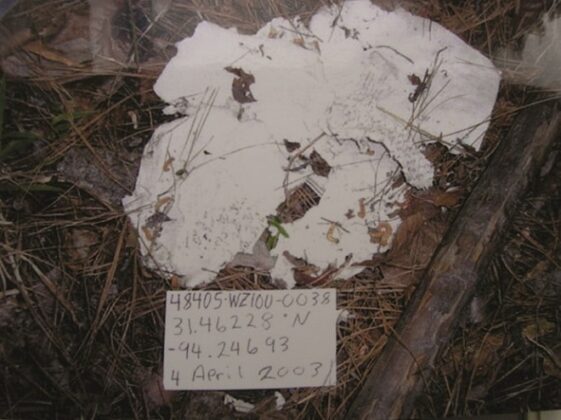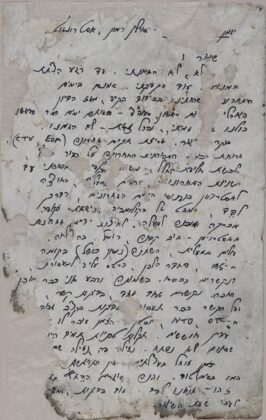– The National Library of Israel is proud to announce it has received the space diary of Ilan Ramon, the first Israeli astronaut, on long-term loan from the Ramon family.
On Saturday, February 1, 2003, Space Shuttle Columbia disintegrated as it reentered earth’s atmosphere, killing all seven astronauts on board. Columbia had successfully completed 27 missions before the disaster, and Ramon’s mission had been routine, with the crew performing 80 science and physics experiments before beginning their return to Earth’s surface.
Like all astronauts before him, Ramon took personal items with him to space. But his had special national significance as well: a tiny Torah scroll rescued from the Bergen-Belsen concentration camp; a copy of a drawing by Petr Ginz, a boy murdered at Auschwitz, titled, “Moon Landscape;” and some wine for blessing on the Jewish Sabbath. There was also a letter from his son Assaf (later a fighter pilot who was tragically killed in a flight training accident in 2009), as well as a notebook for documenting his personal experience.
Ramon had apparently written at least one page before takeoff but wrote the rest of the pages while in space. Some entries are prosaic – describing brushing his teeth in low-gravity, conducting scientific experiments, and expressing longing for his family – but there are also casual mentions of conversations with the Prime Minister of Israel and the President of the United States.
“…Columbia, Houston, we see your tire pressure messages and we did not copy your last,” was the last complete transmission between Columbia and the control center in Houston, before breaking apart over Texas and Louisiana. Miraculously, Ramon’s diary was recovered among the debris in Texas. Researchers believe that the lightweight nature of paper allowed the notebook to go into a slow glide, leaving it relatively undamaged, with most of the damage probably occurring after the return to earth, having landed in a humid, swampy area.
After the discovery, the diary was transferred to the Israel Museum for the complex process of restoration and preservation, assisted by the Israel Police’s forensic department. Identified among the restored pages was the Friday night blessing over wine, with Ramon’s annotations. Apparently aware he was to broadcast the “Kiddush” live from space, Ramon wanted to make sure he did not forget a single word.
After 20 years at the Israel Museum, the diary was recently moved to the National Library of Israel. The item’s physical transition was carried out by Library staff, accompanied by Ramon’s sons, Tal and Yiftach. After initial processing, the diary was scanned by the Library’s digital department, and is now stored in a vault within the Library’s rare items repository, where humidity and temperature conditions are continuously monitored and controlled to protect the treasures within.
Sallai Meridor, Chairman of the Board of the National Library of Israel, said, “The National Library is privileged to be entrusted with safeguarding and preserving this artifact, and to honor the memory of this man who created it, a hero of Israel and the Jewish people, now and for future generations.”
Marcela Szekely, Head of the Conservation Laboratory at the National Library of Israel, said, “The diary is in good company here in the same room as Isaac Newton and Maimonides, along with Ilan Ramon’s letter to Prof. Yeshayahu Leibovitz. After the diary undergoes additional preservation processes, it will be considered for presentation to the public as part of the Library’s permanent exhibition.”
In March 2023, the Library received a copy of a diary logged during space missions by Dr. Jeffrey Hoffman, the first Jewish male NASA astronaut to fly into space. Hoffman brought numerous Jewish objects on his space missions, including a small, light Torah scroll on his fifth and last one. In 1996, while in orbit on the Jewish Sabbath, Hoffman read the scroll from the Book of Genesis, “In the beginning God created the heaven and the earth.”
This article originally appeared in The Librarians, the official online publication of the National Library of Israel dedicated to Jewish, Israeli, and Middle Eastern history, heritage and culture.































